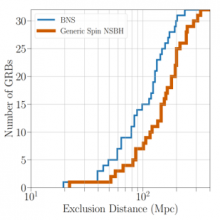
Abstract
We search for gravitational-wave transients associated with gamma-ray bursts detected by the Fermi and Swift satellites during the first part of the third observing run of Advanced LIGO and Advanced Virgo (1 April 2019 15:00 UTC - 1 October 2019 15:00 UTC). 105 gamma-ray bursts were analyzed using a search for generic gravitational-wave transients; 32 gamma-ray bursts were analyzed with a search that specifically targets neutron star binary mergers as short gamma-ray burst progenitors. We describe a method to calculate the probability that triggers from the binary merger targeted search are astrophysical and apply that method to the most significant gamma-ray bursts in that search. We find no significant evidence for gravitational-wave signals associated with the gamma-ray bursts that we followed up, nor for a population of unidentified subthreshold signals. We consider several source types and signal morphologies, and report for these lower bounds on the distance to each gamma-ray burst.